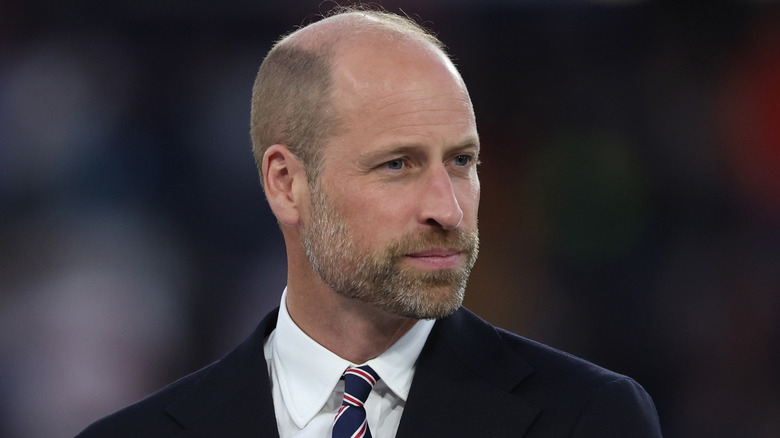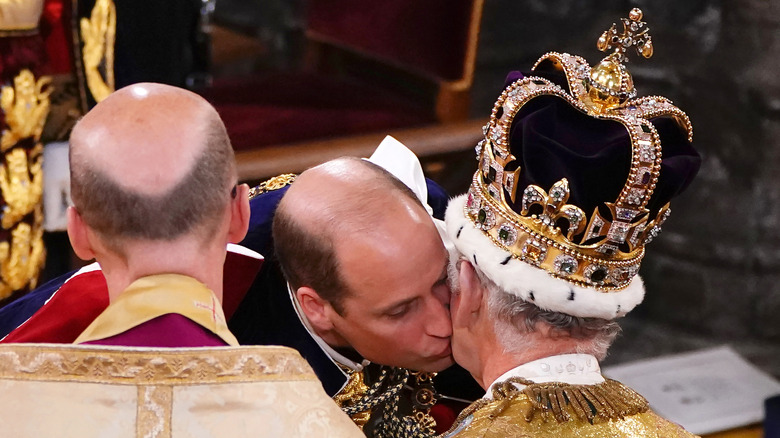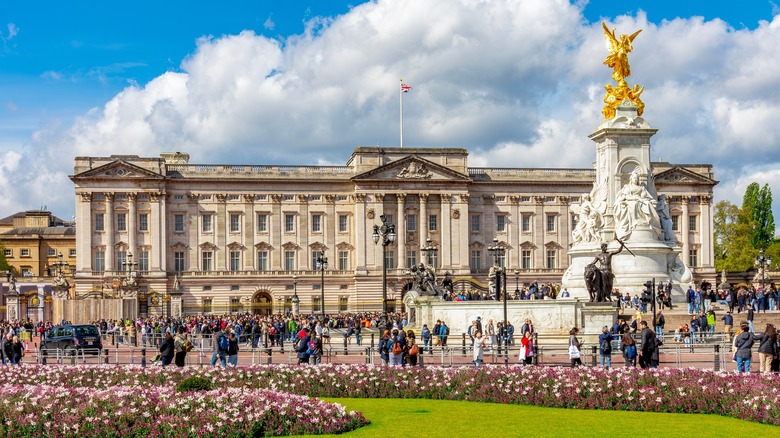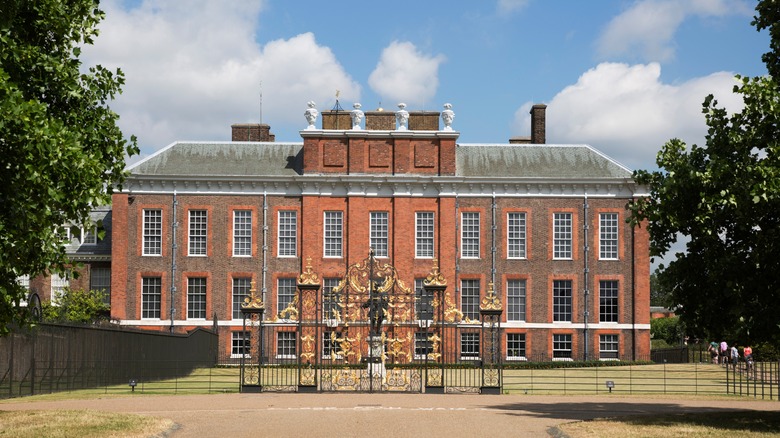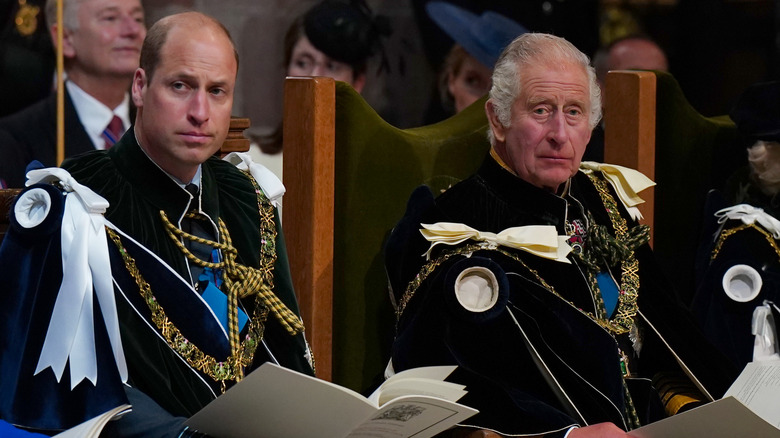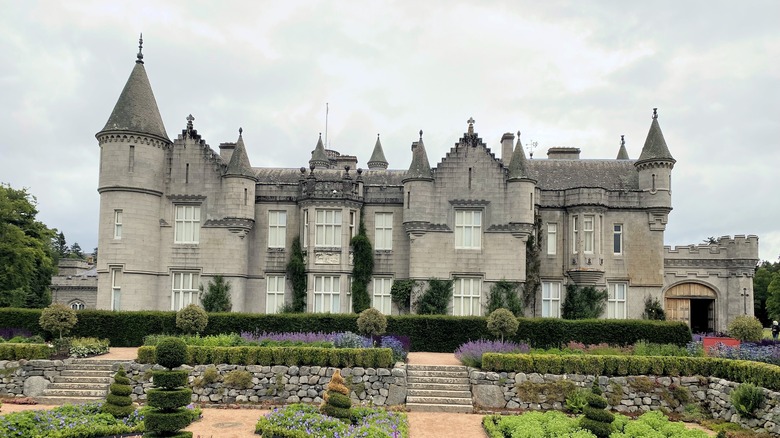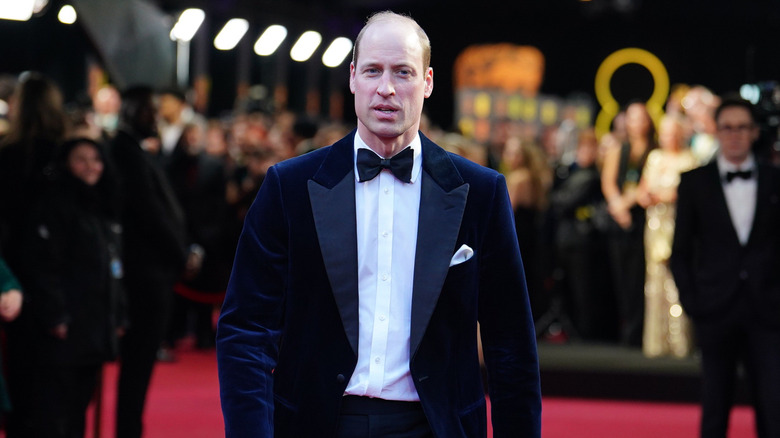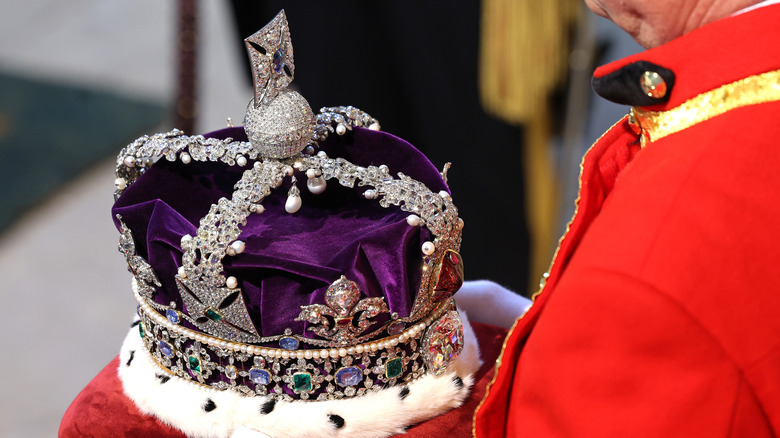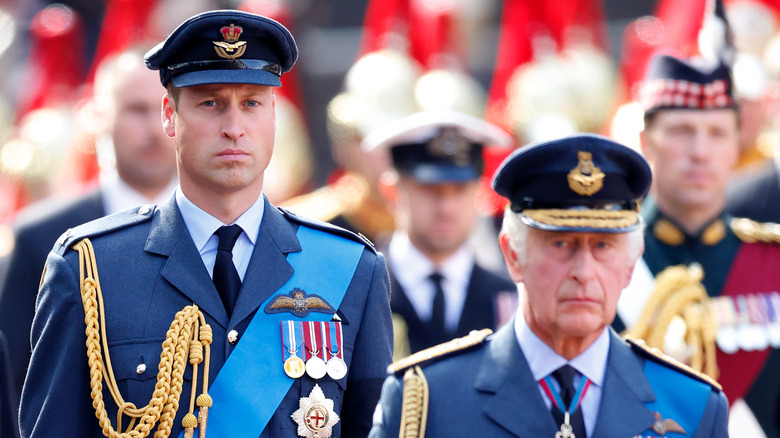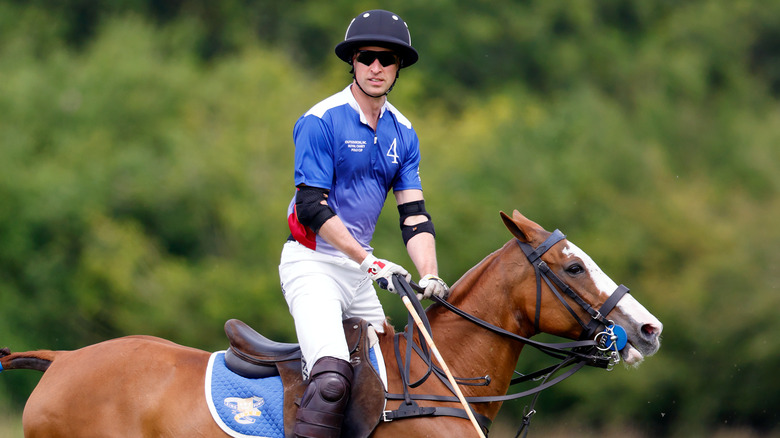What Does Prince William Get When King Charles Dies?
The British royals live incredibly lavish lives, residing in actual palaces and having staff that see to their every whim. They wear diamonds and designer clothes, they vacation at castles, and they fly on private planes to arrive at said castles. Every member of this blue-blooded brood is well taken care of no matter their position within the royal family. No one, though, is quite as well taken care of as the monarch. Right now, that's King Charles III, and his life is pretty luxurious.
But Charles' reign won't last forever. When he dies, his eldest son, Prince William, will assume the throne, and William's life will change immensely. Although William has it good now — he lives in a mansion, he has a private chef, and he's served by a butler, just to name a few of his daily luxuries — when he becomes king, his fortunes are going to multiply in spades. Sure, Prince William will face unique challenges as king, but he's also going to receive a lot of valuable assets in return.
Prince William will take on a new title when King Charles III dies
The first thing belonging to King Charles III to be passed down after his death will be his title, which will go to the next person in the line of succession. Prince William will become the reigning monarch and will officially be king, and the change will happen immediately. His coronation ceremony will take some time to arrange, but for all intents and purposes, William will be king as soon as his father dies.
According to sources, the royal family is prepared for William to become king sooner rather than later. "The people I've spoken to have said that the succession planning, as they call it, began even before Charles' diagnosis," royal author Tom Quinn told Harper's Bazaar, referring to Charles' cancer diagnosis. "I mean, he's the oldest Prince of Wales to become king in history, so succession planning had begun before Charles came to the throne simply because of the age issue."
William's new title won't just be a nominal change — becoming king will come with many new responsibilities for William. Although he won't have any executive political power, William will become the Head of State and have constitutional duties. Furthermore, his input on matters of the nation and the world will hold much greater weight. He'll be responsible for appointing new prime ministers, opening parliament sessions, and assenting to bills that parliament passes. He'll give a speech on Christmas Day, and he'll continue his work as a public servant, likely remaining focused on the issues he's championed thus far, such as the environment and mental health awareness.
Buckingham Palace will become Prince William's responsibility
In modern times, Buckingham Palace has been considered the residence of the reigning British monarch, but that's largely because that's where Queen Elizabeth II lived during her reign, and that lasted seven decades. Although other monarchs have lived there, it's up to each individual monarch which royal residence they want to call home. For example, King Charles III's primary residence is Clarence House, a mansion that he lived in before his mother became queen and that he moved back into in 2003. Prince William and his family currently live at Adelaide Cottage, a Windsor Castle property a little over an hour away from London. Reports have circulated that William and his family are considering a move to Fort Belvedere, which is a bit further from London, but it remains to be seen where William will live when he becomes king.
Whether he lives at Buckingham Palace or not, the property will be passed down to William. Though he won't technically own it — he'll just keep it safe for the next monarch — it will be his responsibility and remain the administrative headquarters of the monarch. Since it has living quarters, if William or his family wanted to spend the night in London, Buckingham Palace would be available for that use. William does reportedly have plans for the residence, though, as he aims to make the entire monarchy, including Buckingham Palace, run in a more modern fashion. "He asks the tough questions and wants the monarchy to be more effective and relevant today," a Times report said of William's plans for the future, per the Hindustan Times.
Prince William will inherit several secondary residences
Buckingham Palace is an incredible property and a huge asset, but that's just the tip of the iceberg when it comes to the real estate Prince William is going to have ownership of when he becomes king. In addition to Buckingham Palace, William will inherit all other royal residences that belong to the crown, as well as some that personally belong to the Windsor family. Some of the more notable properties include Frogmore Cottage, Kensington Palace, Highgrove House, and St. James' Palace, though there are over a dozen properties that William stands to inherit.
Prince William's relationship to each of these properties won't be entirely different from what it is now. He'll only use one as his primary residence, but he will likely use others as secondary personal residences. For example, King Charles III and Camilla, Queen Consort, use the Castle of Mey as a vacation home, so perhaps William and his family will adopt that tradition.
As these properties become William's responsibility, he'll also have the power to allow other members of the royal family — depending on their working status — to use them as their primary residences. For example, when Prince Harry and Meghan Markle were senior members of the royal family, they lived at Frogmore Cottage. When William becomes king, he can allow his brother's family to live at Frogmore Cottage again if Harry and Meghan wanted to do so — Prince Harry has reportedly considered becoming a U.S. citizen, though, so this seems unlikely. Otherwise, William could designate Frogmore as a property for one of his children to live at when they become adults.
King Charles' personal fortune may go to Prince William
Much of the royal family's wealth is tied to state assets, but they've also got significant personal fortunes. When Queen Elizabeth II died, her personal wealth was split among her children and grandchildren. The bulk of Elizabeth's personal fortune, though, which was valued at nearly £370 million ($500 million) the year she died, was passed on to King Charles III, though it's not clear exactly how much of that was cash holdings.
When it comes to King Charles' personal estate, things are a little different than Queen Elizabeth's. To begin, Charles is estimated to be worth more than his mother. His personal net worth reportedly sits at £640 million ($850 million), and that's tied to cash, land, art, jewelry, property, businesses, cars, and more. Much of the king's personal wealth is believed to have come from him carefully saving much of the income he received from the Duchy of Cornwall (more on that later) while he was Prince of Wales.
Moreover, the queen was also a widow when she died, while Charles is currently married. Experts believe that his wife, Camilla, Queen Consort, will inherit a large sum of Charles' personal wealth, unless she dies before Charles. That means William could receive less from his father as Charles' personal wealth could be inherited by Camilla to see her through the end of her life.
Princes William will likely get some of Charles' personal properties
The royal family is not short on places to live. As noted, the crown owns several astonishing estates throughout the United Kingdom, but King Charles III also owns some personal properties. For example, Balmoral Castle, Sandringham Estate, and Clarence House, though considered royal residences, are technically Charles' personal properties that he inherited from Queen Elizabeth II. These buildings have been in the royal family for decades, even centuries, so it's almost certain that Prince William will inherit them. Clarence House could be left to Camilla, Queen Consort, as that's where she and Charles currently reside, though it's far more likely that it will be left to William and be up to him to decide whether Camilla can continue living there.
Charles also has two private properties outside of the United Kingdom, both in Romania. One is located in Transylvania and includes a guesthouse for Charles. The other is a bed and breakfast that any paying guest can stay at. The former property was purchased through the King Charles III Charitable Fund, which is a charitable trust established to support Charles' philanthropic endeavors, so it's unclear who will lay claim to that specific property when William becomes king. Both properties are only estimated to be worth around £810,000 ($1.1 million) each, and while that's a great sum for the average citizen, compared to the billions in property that William will inherit when he becomes king, they're not exactly high in value.
Prince William will inherit the Duchy of Lancaster when Charles dies
Prince William and King Charles III are known by their official royal titles, but they both have multiple titles according to the estates they oversee. Charles, for example, is also the Duke of Lancaster, because he inherited the Duchy of Lancaster from his mother when he became king. The Duchy of Lancaster, also known as the Privy Purse is a private estate that's been in the royal family since 1399. It's comprised of land across the United Kingdom and generates millions each year that serves as the monarch's income. When William becomes king, he'll inherit the Duchy of Lancaster, and therefore, become Duke of Lancaster.
When William becomes king, he will also inherit the Sovereign Grant, a source of public funding that acts as another source of income for the monarch. It's part of the Crown Estate, which helps fund the entire royal operation, and will also be passed on to William. However, the Sovereign Grant, like much of the wealth that the monarchs inherit, isn't going to be William's private property. It's the monarch's to oversee during their reign, and it will be passed on to their successor. When William ascends the throne, he will not be able to profit off of any income generated by the Sovereign Grant, nor will he be able to sell any assets associated with that or the Duchy of Lancaster.
Prince William will become the custodian of the Crown Jewels
There are oodles of baubles that the royal family owns, and the most remarkable of the lot will belong to Prince William when he becomes king. Like other important assets within the firm, William will technically be the custodian of these jewels as they are to stay in the royal family, but he will be able to use them at his discretion. They're kept at the Tower of London (another asset William will inherit as king) under armed guard, and they're traditionally only taken out on special occasions, like the monarch's coronation.
But what exactly are the British Crown Jewels? They're a collection of special pieces that have belonged to the royal family for centuries. One very special piece in the collection is the Imperial State Crown. A rather new piece in the collection, this crown was made for King George VI's coronation in 1937, and it's since been worn by monarchs after their coronations and to other state events. It features literally thousands of diamonds, as well as sapphires, emeralds, pearls, and rubies. A much older piece in the collection is the Sovereign's Sceptre with Cross. This sceptre has been used by every monarch on their coronation day since 1661, and in 1910, it received a massive upgrade in the form of the Cullinan I diamond, a 530.2 carat stone — the world's largest colorless cut diamond — that now serves as the object's centerpiece.
Prince William will become the Supreme Governor of the Church of England
When William becomes king, he will also take on another role, one that some see as more important than any of his other responsibilities. William will become the Supreme Governor of the Church of England. This responsibility has been taken on primarily by English monarchs since the 1550s, and it's a position that's steeped in history. William will be known as the Defender of Faith, and he'll take on this position with an oath that says, "I shall inviolably maintain and preserve the Settlement of the True Protestant Religion as established by the laws of Scotland," per World Religion News.
Though largely ceremonial, William will be responsible for appointing archbishops, bishops, and deans of cathedrals. He'll also likely take on some responsibilities that were established through the position by Queen Elizabeth II, including addressing the church's General Synod. Elizabeth took her role as Supreme Governor of the Church of England very seriously, and in a speech she delivered in 2012 at Lambeth Palace, she shared why the position is so important to the country, even in modern times. "The concept of our established Church is occasionally misunderstood and, I believe, commonly under-appreciated. Its role is not to defend Anglicanism to the exclusion of other religions. Instead, the Church has a duty to protect the free practice of all faiths in this country," the late queen said. When he became king, Charles pledged himself to be as faithful to the position as his mother was, opening the door for William to do the same when he becomes monarch.
Artwork, cars, horses, and more will go to Prince William when he becomes king
No one outside of the royal family could possibly catalog every asset belonging to the Windsors. The list is too long, and there are almost certainly bits that are hidden from the public. However, there are some odds and ends that are widely known and will become the responsibility of Prince William when he becomes king. One such bit is the royal archives, a collection of documents that keep the history of the monarch, both personal and official. The archive is open to the public and can be accessed online. William will also become the custodian to the royal art collection which has been in curation for 500 years. While some of it is on loan to galleries abroad, its contents can also be viewed online.
There's also a collection of private pieces belonging to the royal family that experts imagine will be passed on to William when he becomes king. Though much smaller, the collection is speculated to be spectacular, with a Marc Chagall Bible and pieces by Claude Monet and Salvador Dalí among the lot. In addition to the art, both privately owned by the Windsors and in possession of the monarch on the nation's behalf, William stands to inherit a fleet of luxury vehicles, with Rolls-Royce, Bentley, and Jaguar among the brand names. He'll also inherit prize racehorses and a wildly valuable stamp collection, plus other official gifts that have been amassed by the royal family throughout its time in power.
